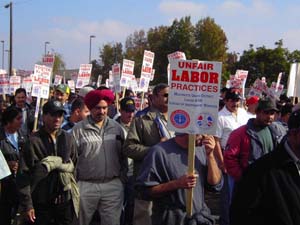Poultry workers walk out in
Livingston, California
Demand union recognition, better conditions
(lead article)

|
Militant/Frank Forrestal
|
October 29 rally by 1,500 poultry workers and supporters outside the
Foster Farms plant in Livingston, California. The action capped a
five-day walkout by the League of Independent Workers of the San
Joaquin Valley—the union organizing the 2,000 workers in one of the
largest chicken processing plants in the country.
|
BY LEA SHERMAN
LIVINGSTON, California—Some 1,500 poultry workers and their friends, family, and supporters rallied outside the Foster Farms poultry processing plant here October 29. The action capped a five-day walkout, with mass 24-hour picketing of the plant, to demand union recognition, improved conditions, and a decent contract.
Workers returned to the job October 31, determined to renew the walkout if progress is not made in negotiations with the company.
The plant of 2,000 workers, one of the largest poultry plants in the country, processes a half a million chickens a day.
The unity forged between the many workers from Mexico and Punjab, India, was evident at the rally. Ralph Meraz, president of the union of protesting workers—the League of Independent Workers of the San Joaquin Valley—gave a talk in Spanish and English, which was translated into Punjabi by one of the workers.
Cheers broke out when Meraz paid tribute to the strength of the many women workers who are part of the fight, and to those in the Punjabi community who provided food and drink for hundreds of workers and supporters each day on the picket line.
Production was slowed at the plant but not stopped. According to Meraz, 1,103 signed the roster indicating participation in the walkout while half the plant, including “replacement” workers hired through a contractor, stayed inside.
A layer of workers who have been fighting for many years to forge a strong union at Foster Farms are spearheading the struggle.
These workers began to organize for an election decertifying the United Food and Commercial Workers eight years ago. They took this action after a 17-day strike in 1997 that left them with a contract that included only a 70-cent wage increase over five years, and increased payments by workers for medical coverage. “We didn’t get the support we should have from the union,” Isabel Mendoza, who voted against that contract, told the Militant at the time.
The workers organized the League as a new union, which won a majority among workers in a vote in 2004.
To strengthen their ability to negotiate a contract, the union affiliated with the International Association of Machinists (IAM) several weeks before the walkout. The company has refused to accept this affiliation, calling it illegal.
“Foster Farms won’t respect our vote for the new union,” said Gloria Castigo, one of the veteran fighters at the plant. “That’s why we came out.”
“Your impressive numbers send a message to Foster Farms that they cannot deny,” IAM District Lodge 190 business representative Jim Beno said at the rally. He announced the opening of a permanent union headquarters at 416 Main Street in Livingston.
Raj Brinder Dhaliwal, one of those who helped organize the new union, has worked for 26 years on the line. He pointed to deteriorating health benefits and low wages as key issues in the struggle. Since 1993 wages have increased by a total of $1.45, for an average annual raise of 12 cents, he said. At the same time, costs for medical coverage have gone up, including a $25 charge for each doctor visit as well as large deductibles.
Sam Arceo, who also participated in the 1980 and 1997 strikes, is a forklift driver with 28 years in the plant. After knee, shoulder, and elbow surgeries, he now has approximately $500 a month garnished from his paycheck to cover medical bills. “I’ve worked all these years to pay for this,” Arceo said. “This should be coming to me.”
Maria Caballero, a machine attendant with 25 years in the plant, said she makes a typical wage for a line worker at the plant—$9.28 an hour. She has joined the fight because of the low wages. “Prices are going up,” said Caballero. “A gallon of milk is $3.75. You pay $50 a week for gas. After all that, there’s nothing left to take home. They charge $7 for one of these chickens. That’s an hour of work.”
“They’ve harassed us, threatened us, discriminated against us—a lot of injustices,” said Francisco Alvarez, a union coordinator in packaging who’s worked in the plant for one year.
A union complaint with the National Labor Relations Board for unfair labor practices by the company is scheduled to be heard December 14.
“We’re stronger because we ourselves are fighting and we believe in ourselves,” said Gurbax Samra, a 28-year veteran in the plant. As an example he pointed to the workers who have become coordinators of union activity in every department.
Betsey Stone and Seth Dellinger contributed to this article.
Related article:
Poultry workers in South fight to organize union
|



